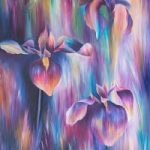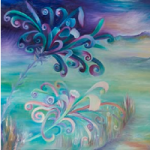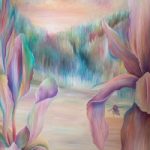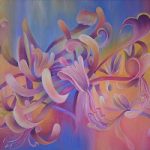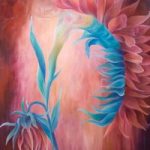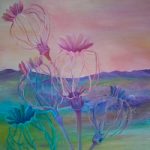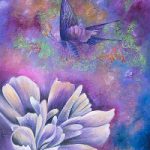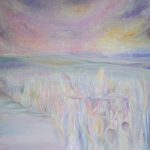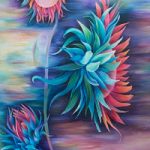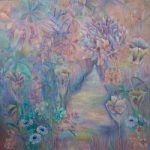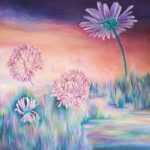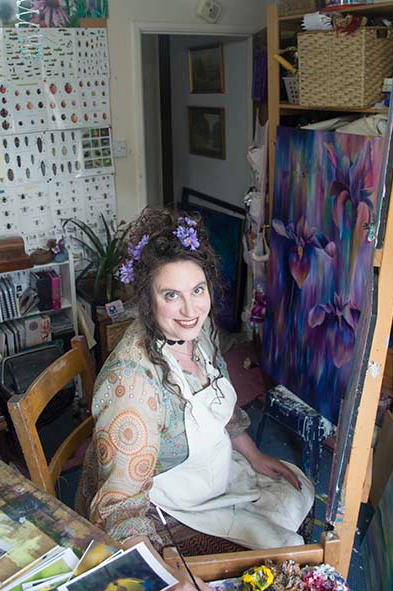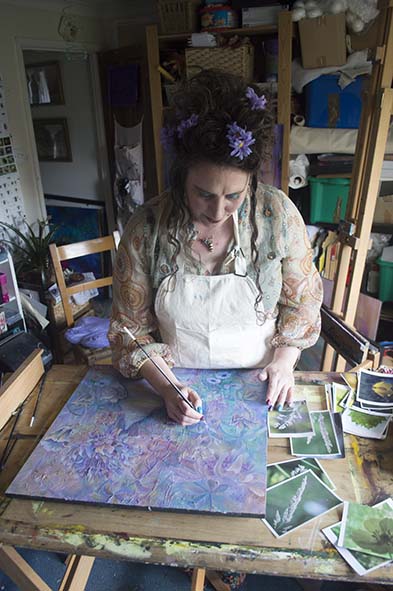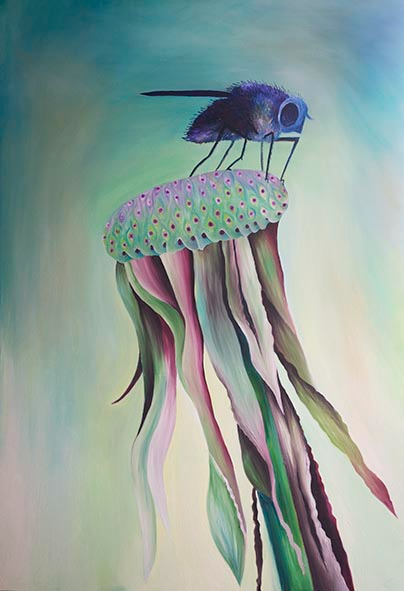Artist: Claire Harrison
Artist: Claire Harrison
Secrets of Nature – Undergrowth
One of a series of paintings on the theme ‘Secrets of Nature’ exploring the idea that the human race is very much a part of nature.
Undergrowth was inspired by my fascination of the minute ecosystem of dramas hidden between the tiny blades of grass beneath our feet. I wanted to create an enclosed feeling of tangled grass and weeds, to make the viewer feel as though they are a tiny insect walking amongst it. I believe if we considered ourselves a part of nature and the ecosystem, we would take better care of it, because homo sapien is a species like any other and is also very vulnerable to climate change.
Within this painting are some corncockles, which have had their sepals replaced with human hands. It is a highly-textured painting because there is more to nature than what we see on the surface, which we tend to take for granted, therefore there are hidden layers to the picture. If you would like to know more about this painting, you can read it in the blog on my website.
Image Size: 50cm x 50cm / 19.5″ x 19.5″
Art Medium: Mixed Media on Board
Original Painting Price: £1,975
Limited Edition Prints: from £145
Should you require a different size of artwork, please do not hesitate to contact me.
Commissions Invited
Contact The Artist
Claire Harrison
Horsham, West Sussex
Artist in Oils and Art Tutor
Exploring the hidden world of nature: flowers, plants and insects.
Please mention the Sussex Artists website
Email: art@claire-harrison.co.uk
Website: www.claire-harrison.co.uk
About The Artist
I am an artist based in Horsham, West Sussex, specialising in oil painting of flowers and insects, sharing my passion for nature and the environment with my followers and clients.
I was aged just three when I painted my very first watercolour. My mum went into the garden and said “choose a flower and let’s paint it”. I chose a purple flower, which for those who know me, I’m generally dressed in purple and turquoise, and my paintings are often of a similar palette!
Before the computer revolution, which now appears to consume most of our lives, I spent my childhood painting and illustrating my own stories in the garden. I loved flowers and plants and most of all growing things. I think it was because I followed my father around the garden with my miniature wheelbarrow. I helped out to the best of my ability and - although I doubt whether I actually did much helping - I was inspired by the bugs, grew mustard and cress from seed on the shed windowsill, and grew Asters in a terracotta pot!
I now have my own garden of course, where I grow lots of flowers - mostly those that are based on Daisy formations. These include Rudbeckias, Heleniums, Ox-Eye Daisies and of course a lot of wildflowers, Cornflowers, Corncockles, Geraniums and Teasel. Teasel is one of my favourites because of the wildlife it attracts, especially in Autumn, where I like to see the Goldfinches feeding, pulling the Teasels over as the seeds pour out.
Looking back in retrospect, I can see where all the influences in my artwork come from - my fascination with pattern, insects and flowers. They were all part of my childhood and what I loved to do.
The majority of my inspiration comes from the local Sussex landscape and my garden. Over the years it has become obvious that the seasons are moving. Spring comes earlier and earlier and Winters are extremely mild. I believe this is an indication of global warming and so many of the scientists and media provide us with information regarding this issue, on a global scale, but what is happening on our doorstep? What invertebrates and wildflowers are threatened and how does that impact on us?
As I write this, we are currently experiencing a heatwave and my crops this year are thriving because of the exceptionally low population of slugs and snails – a gardeners dream perhaps, but also an indication of pressure on the water supply, due to lack of rain. The scarcity of these unpopular molluscs also has an impact on the birds and mammals, such as hedge hogs and thrushes that feed upon them.
I started my “Art Seasonally” blog on my website, to start documenting and comparing the changes in the local climate in Sussex. I draw what I observe each week from life and these are not only for the project, but are also used as research and inspiration for my oil paintings. To read my “Art Seasonally” blog please visit my website.
I began my career in 2001 after graduating with a Fine Art degree, by hiring a local, large gallery space without any completed art works. I had 6 months before my opening, so I needed to create some work! A loan from the bank and a course on self-employment later, I launched my career and created 40 works to exhibit. These were photographic and digitally manipulated works, as I didn’t have a studio. From the success of this exhibition, which was featured in the local press and following an interview on the local radio station, the Director of The Farnham Maltings Arts Centre at my private view, offered me a studio space - and so my art career was born!
Since then, I have exhibited in the UK and abroad, in both solo and selected group shows and I have often been featured in both public and private collections. I sell to clients in several countries including the UK, China and Canada.
I am passionate about art, nature and the environment! I also enjoy sharing my enthusiasm and experience with the local community and I run courses at Guildford Institute and teach on a one-to-one basis.
I have been teaching art techniques, how to develop creativity and how to overcome creative block to children, amateurs and fellow artists for over 15 years. I have found that the artist and their creativity is still shrouded in mystery and thought of as a product of genetic fortune. However, like any other professional, I believe that being an artist is about hard work and practice, just like any other successful business owner or athlete, therefore, I started my “It’s All About Art” blog to try and demystify the creative process, to explain why I do what I do and how I do what I do, with the objective of de-mystifying the role of the artist and motivating all those art students out there.
So many students arrive at classes saying “I will never be an artist” or that they can’t be one, because they don’t have any talent. I believe that everyone can be taught the skill of drawing and painting, but some will ultimately have a natural flair for it. For those who want to become artists, all they need is the persistent drive and motivation to do hours of practice and work to create artworks, in whatever form that may take. “It’s All About Art” blog can be read on my website.
Concept: The Ideas Behind My Work
I am inspired by the landscape around me and much of my work is based upon the plants in my garden that I have nurtured from seed. I have never grown out of the wonder of plants appearing in bare earth. I encourage insects by tending a wild area of garden which grows many indigenous plants that have self-seeded from the local landscape.
My work consists of large brightly coloured oil paintings, highlighting the miniscule on a large scale. I am passionate about colour and emphasise those that I see, which are created by the changing light during the day. I want vivid colours to glow from the canvas, because I want to show that the tiny wildflower or bright beetle in a grass verge, is like a jewel amongst the undergrowth. I explore the miniature, miniscule and microscopic, of both the floral and insect world, and I will often attempt to crawl under the smallest wildflower and photograph from below as if I am an insect looking up. I am fascinated with camouflage, and I often hide insects within my work by using tone to conceal these little creatures. Just as you need to search to find minibeasts in a field, I want the audience to pause to find all the hidden dimensions in my work. This is because the bright colours are merely the surface; I want to combine both impact and detail.
I include a lot of texture in my work; I like the underlying surface to disrupt the outward appearance of the painting. It is a metaphor for the real landscape; we see calming rolling hills or ordered equally spaced trees. There is so much that we do not see, for example, the fragile intertwined relationships between all creatures in the ecosystem.
My fascination for patterns is shown in my intricate ink drawings and watercolours, where I often depict the many spirals found within the centre of daisy-like flowers. Having studied plants under a microscope for many years, I attempt to show that they are not all that we perceive; instead I draw the intricate detail from both the microscope and the naked eye. I want to show that nature, however small, is magnificent and important. Nature is not just a vista, or a landscape, it is the interdependent relationships between all creatures, flora and fauna. Nature is a perfectly ordered mechanism that we dismiss as an overgrown landscape full of creepy crawlies, where in fact it is a complex, beautiful ecosystem of each organism reliant upon another.


